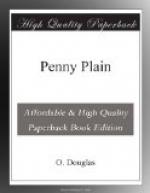“No, but Episcopalians are slightly better fitted for society than Presbyterians, and this young man seems quite a gentleman—such a blessing, too, when they haven’t got wives. Dear, dear, I told Dickie not to send in any more of that plant—what d’you call it?” (It was a peculiarity of Mrs. Duff-Whalley that she never could remember the names of any but the simplest flowers.) “I don’t like its perfume. What was I saying? Of course, I only got up this dinner on the spur of the moment, so to speak, when I met Mr. Elliot in the Highgate. He comes and goes so much you never know when he’s at Laverlaw; if you write or telephone he’s always got another engagement. But when I met him face to face I just said, ‘Now, when will you dine with us, Mr. Elliot?’ and he hummed and hawed a bit and then fixed to-night.”
“Perhaps he didn’t want to come,” Muriel suggested as she snuggled one of the small dogs against her face. “And did it love its own mummy, then, darling snub-nose pet?”
Her mother scouted the idea.
“Why should he not want to come? Do put down those dogs, Muriel. I never get used to see you kissing them. A good dinner and everything comfortable, and you to play the piano to him taught by the best masters—he’s ill to please. And he’s not very well off, though he does own Laverlaw. It’s the time the family has been there that gives him the standing. I must say, he isn’t in the least genial, but he gets that from his mother. A starchier old woman I never met. I remember your father and I were staying at the Hydro when old Elliot died, and his son was killed before that, shooting lions or something in Africa, so this Lewis Elliot, who was a nephew, inherited. We thought we would go and ask if by any chance they wanted to sell the place, so we called in a friendly way, though we didn’t know them, of course. It was old Mrs. Elliot we saw, and my word, she was cold. As polite as you like, but as icy as the North Pole. Your father had some vulgar sayings I couldn’t break him off, and he said as we drove out of the lodge gates, ’Well, that old wife gave us our heads in our laps and our lugs to play wi’.’”
“Why, mother!” Muriel cried, astonished. Her mother was never heard to use a Scots expression and thought even a Scots song slightly vulgar.
“I know—I know,” said Mrs. Duff-Whalley hastily. “It just came over me for a minute how your father said it. He was a very amusing man, your father, very bright to live with, though he was too fond of low Scots expressions for my taste; and he would eat cheese to his tea. It kept us down, you know. I’ve risen a lot in the world since your father left us, though I miss him, of course. He used to laugh at Minnie’s ideas. It was Minnie got us to send Gordon to an English school and then to Cambridge, and take the hyphen. Your father had many a laugh at the hyphen, and before the servants too! You see, Minnie went to a high-class school and made friends with the right people, and learned how things should be done. She had always assurance, had Minnie. The way she could order the waiters about in those grand London hotels! And then she married Egerton-Thomson. But you’re better-looking, Muriel.”




